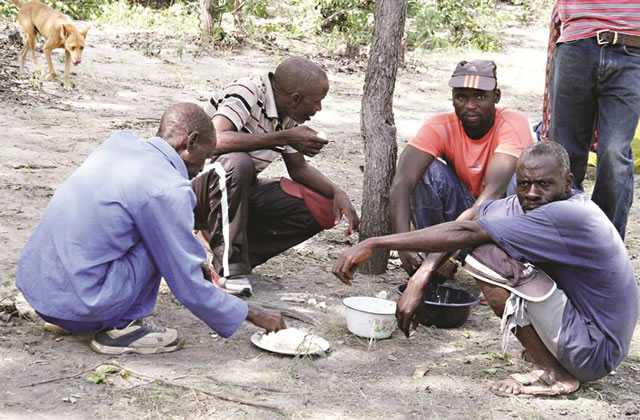The San: Climate change and lifestyle

Lungelo Ndhlovu
THE nomadic Tshwao community, popularly known as the San or Amasili in Ndebele, has experienced first hand, the impact of climate change which has disintegrated families in Tsholotsho.
Men are forced by circumstances to become herdsmen in Botswana while women and children remain behind to work for other tribes in order to sustain teir families. The majority of San can not send their children to school because of little income and can not divert from their traditional routine of hunting and gathering.
The San community is found in Tsholotsho and Bulilima, in Matabeleland South, where they have lived under the dominance of BaKalanga and Ndebele tribes for the past century. Statistics by the Creative Arts and Education Development Association (Caeda), an organisation which lobbies for the interests of the marginalised San and that sets to revive the Tshwao language, show that there are about 2,000 San people in Zimbabwe with 457 found in Plumtree, eight in Matobo and 1,165 in Tsholotsho. San communities in Tsholotsho live in Mazibulala and Dlamini villages. They can also be found in Wards 1,2,7,8 and 10.
According to a Climate Change expert, Collen Mutasa, climate change refers to long term variations in temperature, wind and precipitation for a certain area.
“For one to say the climate has changed there should be rigorous monitoring of the weather and temperature of that area for a long time. Climate change is defined in about 30 years and from such observation then one can talk of climate change.
“Africa is the most vulnerable to climate change and its effects. Zimbabwe was once hit by cyclones like Japhet and Eline in the past years and these are effects of climate change,” said Mutasa.
When people don’t receive adequate rainfall in their area, or get high temperatures or too much rainfall over a period of time, they think this is climate change.
This is just a variation in the weather patterns until such state of events persist for a very long time to about 30 years that’s when we can gazette the climate change of that area. Climate change is defined over a period of 30 years or more.
Speaking during a climate change and gender workshop in Bulawayo recently, Caeda director, Davy Ndlovu, said the impact and effects of climate change are unbearable for the San people who are still bound by their traditional, nomadic way of life.
“As you know the San people are hunters and gatherers. Nowadays it is impossible to go into the bush and hunt because of legislation which has been put in place to protect wild animals and the environment,” said Ndlovu.
In the past, the San used to live in small groups of 10-40 people and occupy well defined territories, where they had access to water, game, plants and other resources. Today it is not the case because of climate change. The San communities are highly dependent on local natural resources for their livelihoods, because of their responsibility to secure water, food in the form of fish and energy for cooking and heating.
The effects of climate change, including drought, uncertain rainfall and deforestation make it harder to secure these resources. According to a presentation by the Meteorological department of Zimbabwe, there has been an increase in temperature recorded from 1962-2004 in this country. There has been a decrease of rainfall since 1901-2010 and these changes keeps on affecting all humanity.
Women and children are most vulnerable to the effects of climate change because they are highly dependent on local natural resources for their livelihoods since their responsibility is to secure water, food and energy for cooking and heating.
“It’s extremely important to understand gender differentiated impacts in order to be able to formulate an effective and sustainable response to climate change in terms of what it means for policy and programming,” said one speaker from the Meteorological department during the workshop.
San communities are reported to be failing to adapt to the effects of climate change.
“The San communities are struggling to adapt to a sedentary lifestyle because rains are not there, the rivers and dams have dried up, plants are drying up.
“When the San are struggling to adapt to a sedentary lifestyle, they now have to deal with climate change because its effects have contributed to household break down, where women and children are seriously bearing the brunt.
“Men always go to Botswana to look for work and they work as cattle herders and they cannot afford to send the money home as it is very little. Women and children end up working for other tribes for food,” said Ndlovu.
One community village head for Ward One Portia Ncube said the San population community in Plumtree is seriously affected by hunger and in need of food relief aid.
“The major challenge for these people is that they don’t go to the fields like some of us. Although some go but the rest are always loitering around during the farming season, doing nothing. This year crops are dwindling as compared to last year where some of us were able to assist the San. Food relief organisations must do something to address the San’s plight,” said Ncube.
Lately Zimbabwe has concluded a climate change policy, meant to address issues relating to climate and adaptation. Recommendations and the way forward was mapped, with the Ministry of Agriculture promising to work with the Ministry of Women Affairs, Gender and Community Development in mainstreaming gender into their projects.
Civil society emphasised the need for more environmental education to youths, children, women, and men. Universities were also urged to incorporate climate change and gender into their priority area of research. Agriculture organisations were urged to upscale awareness to the farmers. All stakeholders were encouraged to balance environmental benefits and economic benefits.









Comments